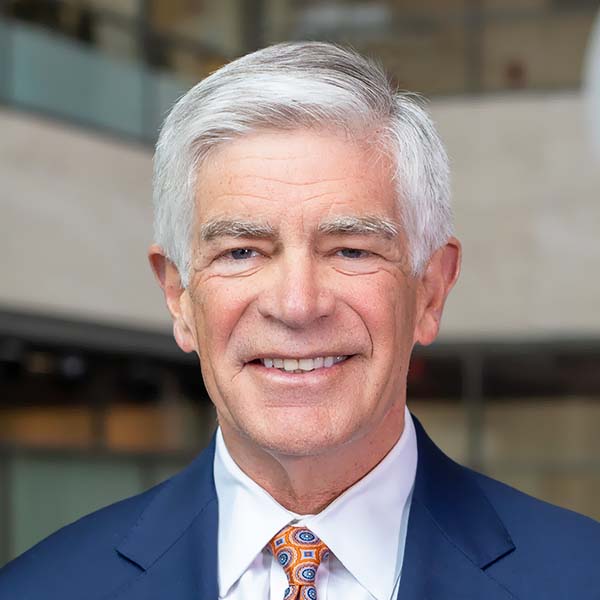Introduction
Good morning. I want to thank Phil Wenger for that kind introduction.
I would also like to thank Jim Edrington of the ABA (American Bankers Association) and my Fed colleague and Stonier board member, Connie Wallgren, for inviting me here to speak with you today.
A New Journey
So, this is the first time I am delivering a new class welcome speech not as an academic, dean, or university president. I have to admit that it feels kind of strange. At the same time, it offers a nice change of perspective.
For instance, as I look out at this distinguished crowd this morning, I can't help but ponder how many of you I can recruit to the Fed upon graduation. But seriously, I can relate to how many of you must feel as you embark on this new journey, whether you are just entering or graduating next week.
It has been almost a year since I joined the Federal Reserve Bank of Philadelphia as its president and CEO. I came to the position after a long career in academia, mostly here at the University of Pennsylvania.
I would imagine that you might have mixed feelings of excitement, fear, hope, and the desire for a new challenge. Sure, there are many unknowns ahead, but what is certain is that the step you take here is a necessary one toward the highest leadership in your industry. I know your field faces major challenges each day due to new regulations, technologies, and security.
When I was the dean of the Wharton School of the University of Pennsylvania, and now as president of the Philadelphia Fed, many of my days are spent with banking leaders. Along with my colleagues in Supervision and Regulation at the Fed, we are in touch regularly with industry leaders every day to discuss ways to ensure the safety, soundness, and vitality of our financial institutions.
The Fed aims to provide appropriate balance to the oversight of these organizations in our District. This can be tricky at times, and, as with any industry or situation in which change is a constant, great leadership is needed.
Leaders are needed who can anticipate what may be coming, plan appropriately for it, and inspire and teach their teams at the same time. This is no easy feat, but you are in the right place to learn.
From the University of Pennsylvania
Although I am no longer at the University of Pennsylvania, it is a place that never leaves me. Not a day goes by at the Fed that a Wharton professor, piece of research, book, or conference doesn't come up in conversation. And, so many at the Fed bring their Stonier and Wharton experience to work, which is such an asset to the Bank. I use my own education at Penn to apply problem-solving skills from my engineering days to tackle great issues in our economy.
For those entering Stonier, an unparalleled experience awaits you. Your courses will be grounded in the reality of today's marketplace. For those graduating, you know I speak the truth.
I know from my own Wharton experience that the faculty members here are some of the best in the world in teaching executives how to show up and perform. In moments of crisis, confusion, and change, some people without formal training might mistakenly throw in the towel at a key moment or choose to steamroll ahead without a team.
Your three years here will help you recognize and address the changes and opportunities in your path that can create value in your organizations. But perhaps the hardest part of this learning involves both skill and character. It is learning how to become someone who others will admire and follow. This is lifelong learning.
A Few Words of Wisdom
For those heading back to campus, perhaps you will humor me as you consider a few suggestions and lessons I have learned about leadership over the years and during my past 11 months at the Fed. I do believe they apply wherever you are in your career.
No. 1: It's good to set your course but make sure it's not too straight.
You are not out here on your own. Because you chose to continue your education, you now have access to Stonier and Wharton professors, along with more than 20,000 Stonier alumni and Wharton's 94,000 graduates.
But just because everything is lining up as it should and you may know the exact course you would like to take in your career, it doesn't mean that walking a straight line from point A to point B is the best way.
Education isn't a race; it's a journey. My advice for you, which I use myself, is to get lost on occasion. Wander around. Be accessible. In fact, throughout your studies and beyond, schedule time for random conversations with smart people who may have little to do with your classes or professions.
I say this for two reasons:
First, the smart people around me every day — some of whom have worked with me several times — make sure that the very first thing I do when I come on board is to walk the halls and schedule lunches with employees.
As a leader of your organization, you should do this. It's a fun and invaluable use of your time, and it gives you a chance to get to know employees and customers and see what their day to day is like.
Second, another benefit of wandering around aimlessly every now and then is that you never know what might pique your interest for further learning.
Successful leaders are well read, well rounded, and able to strike up a conversation at any moment. I personally believe that, in banking, it is perhaps as important to have an inherent capacity for numbers as it is to cultivate an intuitive sense for people and relationships. A campus is a wonderful place to practice the social aspect of your leadership.
No. 2: There is something else I have learned to value greatly from my first year at the Fed: Groupthink does not benefit anyone, especially a leader. Similar to a room filled with bankers, a Federal Open Market Committee (FOMC) meeting in Washington, D.C. is made up of smart, headstrong, and independent individuals.
As regional Fed presidents — tasked with a dual mandate of maximizing employment and stabilizing prices — we come to eight annual FOMC meetings armed with regional, data-driven, and anecdotal perspectives to contribute to a national conversation. The goal of the interaction is for each individual's perspective to fit into a larger, national equation. I have found the FOMC meetings to be an example of a great challenge in leadership — in this case, of Chair Janet Yellen.
In becoming a leader, one must learn how to steer strong personalities toward one unified goal in a set amount of time. The best way to do this, while developing your organization's talent, is to discourage a groupthink environment. It is easy for an organization to fall into this dynamic, but it is ultimately the wrong direction. The best decisions and results in which I have taken part within the central banking system have come through lively and thoughtful debate.
The next three years will offer a great opportunity for you to develop the ability to discuss and formulate different theories productively, respectfully, and efficiently.
No. 3: Another key every day is to know what you can and cannot change.
We know our limits as policymakers, and we must remind the public of them regularly. The Fed is not in a position to make great changes that can move the needle on the long-term health of the economy. These types of sweeping moves come from policy decisions focused on areas such as taxes, education, and immigration.
I believe there is a lesson to be learned about the importance of quickly and clearly identifying what you can accomplish — whether it seems significant or not to the outside world — and to do it very well.
Finally, it's a good idea for every leader to learn how to keep the long view of a situation as the focal point.
Something you may face in moving up in leadership — and this is certainly the case in guiding monetary policy — is that the decisions you make today may not play out for some time. In fact, it may be years after you have left your position that the fruits of your labor actually produce the best results. This can be challenging on a personal level; however, it is the responsibility of you as a leader to make the moves today that will best position the organization — not you — tomorrow.
When others look back at the past, what should matter is that you are regarded as someone who had the organization's best interests at heart. Perhaps you could spend some time thinking about this inside and outside the classroom. Maybe it's a topic you haven't yet considered.
In Conclusion
In closing, banks are at the heart of our free market system. And there is a true need for effective and efficient funding of companies. In addition, we also must make sure that American citizens can save for the future they want to create.
I believe that banks are only as strong as the people who run them; that is why I am pleased to take time this morning to be with you. I believe, fundamentally, in the Stonier approach to help you become the kind of banking leaders your organization and the country needs.
Congratulations and thank you for your time. I believe we have time for questions.
Note: The views expressed are my own and not necessarily those of the Federal Reserve System or the FOMC.
View the Full Speech
